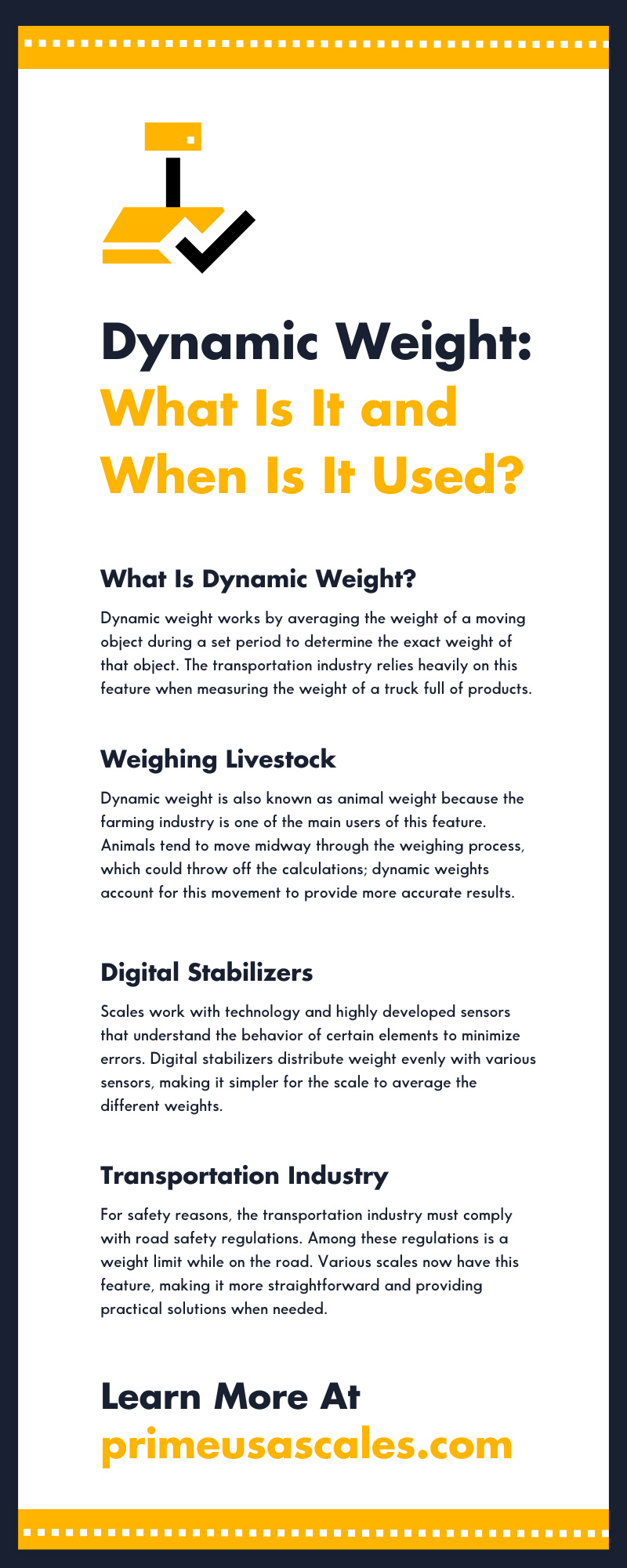
Technology moves quickly, with industries developing new and better ways to achieve results in less time while minimizing errors to elevate efficiency. Many businesses and industries rely on weight scales to provide better services with correct measurements to maintain relationships with clients strong.
Industries like transportation and storage provide services where scales are necessary, both to meet customer expectations and comply with safety regulations. Other industries work with moving elements and fluctuating weights that require the use of specialized devices to obtain reliable results.
Businesses can use dynamic weight when they need to complete certain processes while avoiding errors and delivering accurate results. Various industries could elevate their value using this feature and develop better practices by investing in scales that allow for dynamic weight measurement. Read on to learn more about what dynamic weight is and when various industries use it.
What Is Dynamic Weight?
Dynamic weight works by averaging the weight of a moving object during a set period to determine the exact weight of that object. The transportation industry relies heavily on this feature when measuring the weight of a truck full of products. Additionally, the agricultural industry uses dynamic weight when they need to know the weight of their animals.
This feature results from years of challenging experiences with constant movement that regular scales could not overcome. Dynamic weight will deliver accurate results while processing data with specialized software that will give out numbers based on the minimum and maximum fluctuations.
Weighing Livestock
Dynamic weight is also known as animal weight because the farming industry is one of the main users of this feature. Animals tend to move midway through the weighing process, which could throw off the calculations; dynamic weights account for this movement to provide more accurate results.
A veterinary floor scale works with internal calculations that will average the initial weight with the highest, so it will measure with precision no matter how much the animals move. It is important to weigh one animal at a time; the scale works with averages, so it would be challenging to know the weight of just one animal among many.
Digital Stabilizers
Scales work with technology and highly developed sensors that understand the behavior of certain elements to minimize errors. Digital stabilizers distribute weight evenly with various sensors, making it simpler for the scale to average the different weights.
The manufacturers of scales featuring dynamic weight understand that not everything reacts the same weight to the same conditions. The platforms for the scale connect directly to the sensors, and choosing which process you need will deliver results despite ongoing movement.
Transportation Industry
For safety reasons, the transportation industry must comply with road safety regulations. Among these regulations is a weight limit while on the road. Various scales now have this feature, making it more straightforward and providing practical solutions when needed. Trucks must weigh in before and after distributing the products inside; the size and shapes of the products may vary, which dynamic weight can manage effectively.
The weight distribution of a truck is essential because roads sometimes have curves or bumps that could throw off a truck’s balance and cause it to flip over. Meeting weight regulations will prevent accidents, ensuring that a business can accomplish timely deliveries without issue.
Mining Industry
Rocks and minerals have unique properties that might seem not to change, but these properties are in constant movement. Some minerals can change their composition when exposed to certain weather conditions; if your business works with these elements, you need a reliable scale.
Rocks can lose density, and elements like sand can shift during measurement; constantly monitoring with dynamic weight will reduce error and maintain consistency. Using dynamic weight is the best solution when weighing items throughout the mining industry.
Laboratory Practices
Laboratories rely on scales to use the exact amount of ingredients in processes requiring accuracy. Mixing certain liquids, gases, and solids will cause chemical reactions, causing the weight to fluctuate and constantly change.
Dynamic weight will minimize error and track how much change a process can make, allowing technicians and scientists to understand the development of a substance. Learning the exact steps of a reaction with the help of a scale will increase accuracy and allow for the recreation of many experiments.
Food Measurement
Various industries that work with food, like restaurants and hotels, work in a fast-paced environment that relies on precision to deliver results. Correctly measuring food is key to keeping a business environment functional and ready. Food ingredients such as powdered substances, grains, beans, and even vegetables could throw off balance accuracy, which is the reason why dynamic weight is essential.
Another important use of dynamic weight within the food industry involves liquids. Animal feeds like molasses result from various elements that transform into thick substances containing iron, selenium, and copper. The process of creating the final product can lead to a fluctuating weight that is difficult to measure with a standard scale.
Breweries
Liquid products that require a long manufacturing process, like craft beer, might change weight over time. For breweries, measuring and recording these changes is crucial. The initial ingredient quantities could be consistent, but when they encounter other substances, they can change their composition.
Professionals in the craft beer industry utilize different natural and artificial ingredients, which could add to the fluctuating weight of a liquid in its final stage. Breweries work with sealed wooden or stainless-steel containers that trap fermentation gases, which contribute to a fluctuating weight.
Tare Weight and Dynamic Weight
This option relates to dynamic weight because tare weight removes the weight of a container that might be necessary for objects such as condiments and small ingredients. Dynamic weight will minimize movement and average the different weight results, while tare weight will remove unwanted added weight.
Various features will work simultaneously to produce accurate and reliable results with different objects that otherwise would fluctuate too much. The best way to minimize errors is to stabilize an object as much as possible before you begin measuring.
Scales continue to develop better and faster processes to achieve accurate results, and with new features, measuring products is simpler than ever. You can deliver better results in your business with the right equipment—invest in a scale with the features that benefit your needs. Call us today at (866) 644-9815 to speak with an expert and find the right solution for your business. We look forward to hearing from you!
